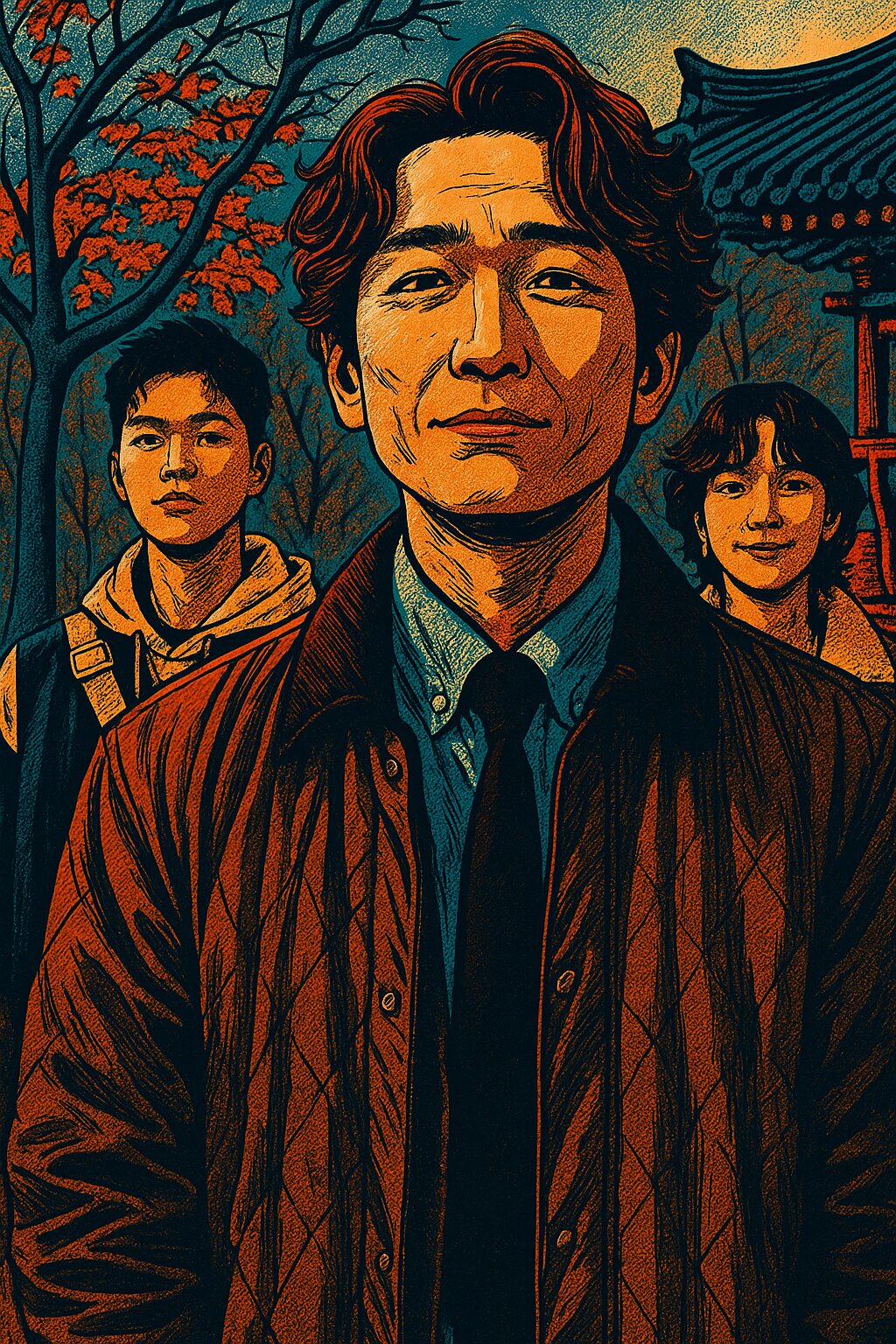From the very first courtroom apparition to the tear‑jerking final scene, Oh My Ghost Clients has kept us perched on the edge of our seats. In its two‑episode grand finale, this delightfully off‑beat drama wraps up its tale of spectral teamwork, white‑collar greed, and blue‑collar valor with a fittingly dramatic flourish. It brings together all the loose ends—USBs, crooked CEOs, secret handshakes, and even long‑lost brothers—into one electrifying crescendo.
Oddball friendships bloom. Corporate sins get laid bare. And, unexpectedly, our hero’s heartache finds its healing. If you thought a labor attorney thriller couldn’t pair well with ghostly cameos, think again. By the time the credits roll, you’ll be juggling a fistful of tissues, a rogue chuckle, and a newfound respect for factory workers everywhere.
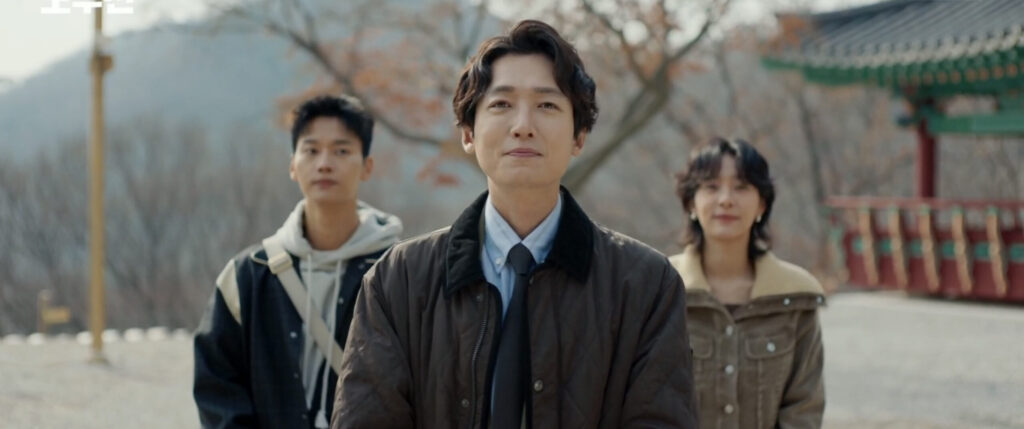
TL;DR
- Ghostly legal drama ends big: “Oh My Ghost Clients” wraps up with an electrifying two-episode finale.
- Corporate villains get their due: Crooked CEOs and corrupt politicians face karmic consequences.
- Hero finds healing: Mu-jin confronts his grief and finds reconciliation.
- Unexpected alliances win the day: Mortals and ghosts team up to fight for justice.
- Powerful message on labor rights: The show highlights the importance of human dignity in the workplace.
Episode 9 Recap: USBs, Plant‑Pot Flinging, and Self‑Rescue Mechanics
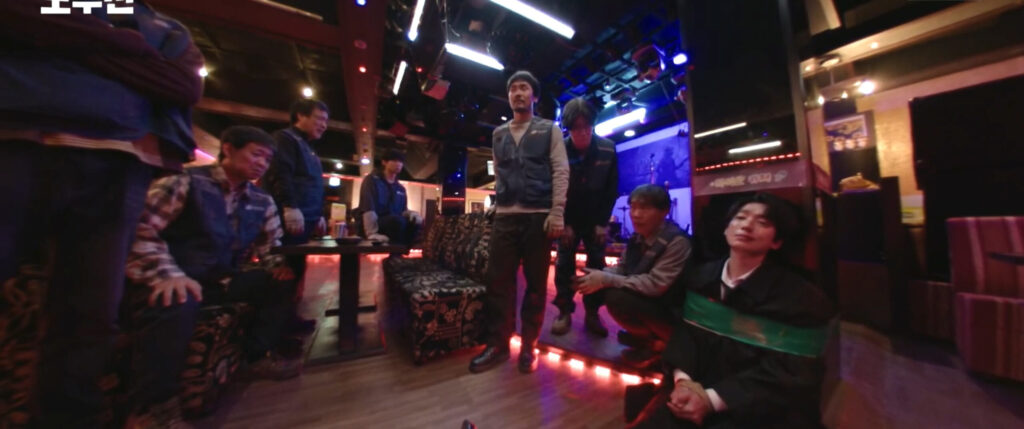
The morning opens on an ominous note: Manager Choi has supposedly taken his own life. Guilt‑ridden and stunned, Mu‑jin (our labor rights crusader) spirals into silence, avoiding calls from friends and even the booth where his ghostly partners dwell. Cue the hovering specters, worriedly poking their ethereal heads around corners.
But rewind eight hours earlier: our plucky duo Hee‑joo and Gyeon‑woo infiltrate Myungeum Foods’ factory office, now scored for the precious USB drive holding damning evidence. Imagine a heist scene, only instead of black‑clad ninjas, you have a pizza‑lunch‑fuelled ghost slinger armed with potted plants. The USB is cleverly taped under a gochujang tub lid—very Korean twist—and Gyeon‑woo snatches it. In classic sitcom fashion, Hee‑joo stays behind to lob greenery at oncoming thugs, turning the office into a botanical battleground.
Just when escape seems assured, the USB slips from Hee‑joo’s deep pocket. Our dynamic duo pause mid‑tussle, puzzled by why their pursuers stop to high‑five. Meanwhile, the drive bounces across the floor as slow‑motion triumph music swells in the villain’s background. And indeed, we learn that Manager Choi, cajoled by a prosecutor on Myungeum’s payroll, handed over the location in a shaky plea bargain that culminated in tragedy.
Mu‑jin’s Guilt Trip and the Turning Point
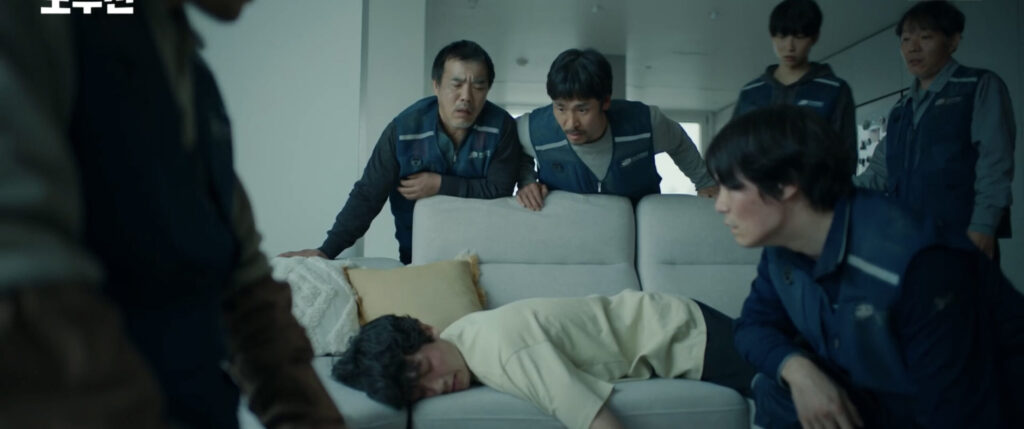
When Mu‑jin learns of Choi’s death via the morning news, he vanishes into depression. He ignores phones. He drowns in regret. Even the ghosts—Bo‑sal and Co.—find him a tougher client than any boardroom bully. Finally, he drags himself to Choi’s funeral. Surrounded by grieving family, Mu‑jin steels himself. The seeds of resolve sprout amid the black‑clad mourners.
Back at the office, Hee‑joo and Gyeon‑woo press him to push on. Instead, Mu‑jin feigns that Myungeum paid him off. It’s a bluff to protect his friends. Gyeon‑woo’s soft “I’m disappointed, hyung” cuts deeper than Hee‑joo’s scathing retort ever could. Yet, underneath the put‑on betrayal, Mu‑jin’s true plan unfolds: rally the ghosts and storm Myungeum’s fortress one last time.
Episode 10 Recap: From Boardroom Tempests to Cosmic Pocket Dimensions
Enter Assemblywoman Moon Jung‑eun (Moon So‑ri), corporate lobbyist extraordinaire, hawking “pro‑business policies” in exchange for campaign cash. She grins smugly while justifying corporate carnage. But across the table stands Mu‑jin, now wearing the mantle of an avenging specter. Labor violation stats rain down like tearing headlines: crushed fingers, suffocating dust, unpaid overtime.
With a theatrical kick‑open, Mu‑jin bursts into the conference room—lights flicker, walls quake, and ghosts swirl. It’s both hilarious and legitimately spooky. Chairman Kim breaks under the pressure, blurting out every corrupt deal into Mu‑jin’s recorder. Cue photo‑finish: the scene freezes into Mu‑jin’s triumphant grin.
But Myungeum’s sorry engineering soon shows. The office tower creaks perilously. Rather than ghost magic, it’s shoddy cement and crooked welds giving in to physics. Karma never looked so literal. As beams buckle, a hapless worker tumbles toward oblivion. Chairman Kim, ever the villain, hesitates—prying the man’s fingers off the ledge while still muttering about “compensation packages.” Instant karmic payback: Kim himself plummets, dragging Mu‑jin into the abyss.
They awaken in Bo‑sal’s pocket dimension—a purgatorial waiting room with just enough breeze to make you question your life choices. Our guardian ghost exacts divine terror. Smack‑bang in the middle of his celestial audit, Kim scribbles a contract to obey every labor law in sight. Divine mic drop.
In a blink, time rewinds. The building stands firm again. This time, Kim evacuates workers without second thought. He signs off on expensive repairs. Assemblywoman Moon flips her stance, championing stricter corporate oversight—because reputation matters, apparently. Mu‑jin closes the chapter on criminal hearings by representing bereaved families in court, while the ghosts join their loved ones one final time, releasing their earthly ties.
Final Scenes: Healing Wounds and Cryptocurrency Wins
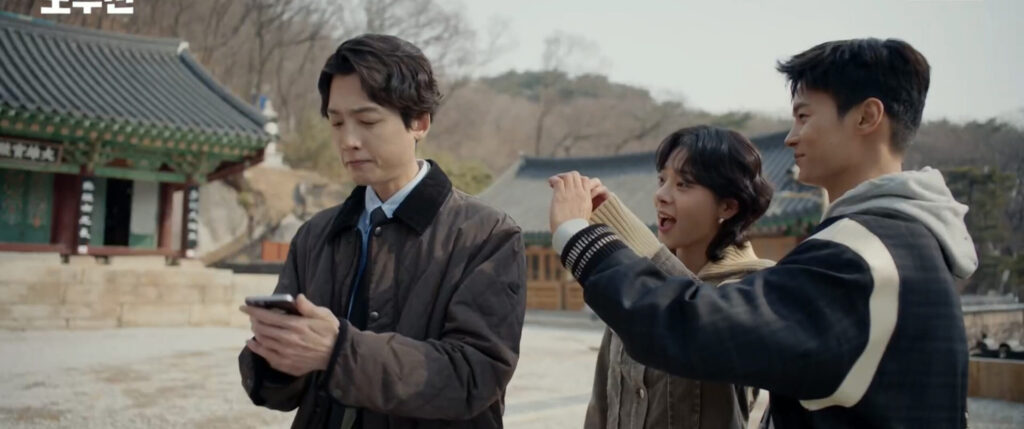
With the press frenzy behind him, Mu‑jin takes a call from Mi‑joo—his girlfriend—reminding him that real life awaits. On his way home, his late brother Woo‑jin appears in spectral form at the doorstep. Family supper is lonely without him. For ten years Mu‑jin has shouldered grief alone; now Woo‑jin gently encourages him to cry, to voice the pain instead of bottling it up. His final “I love you, little brother” echoes in Mu‑jin’s sobs.
Cut to morning: Mu‑jin, buoyed by a lucky crypto surge, repays Mi‑joo every cent of the severance she covered. No more solo decisions. He whispers “I love you,” their reconciliation sweet enough to make you forget your own bills.
Returning to Jeon Tae‑il’s statue—symbol of Korea’s labor rights movement—Mu‑jin and Bo‑sal share a quiet moment. “The world’s slow, but it’s moving,” the ghost intones. It’s a recognition that change happens one step at a time. Hee‑joo and Gyeon‑woo join the scene, snapping selfies with the statue—only Bo‑sal remains blissfully out of frame. Gyeon‑woo jokes, “Your invisibility still works, spirit friend.”
As they stroll away, a familiar voice beckons Mu‑jin. He spins around and pouts—still seeing ghost clients, it seems. Because some cases never close.
Fresh Insights and Deeper Meanings
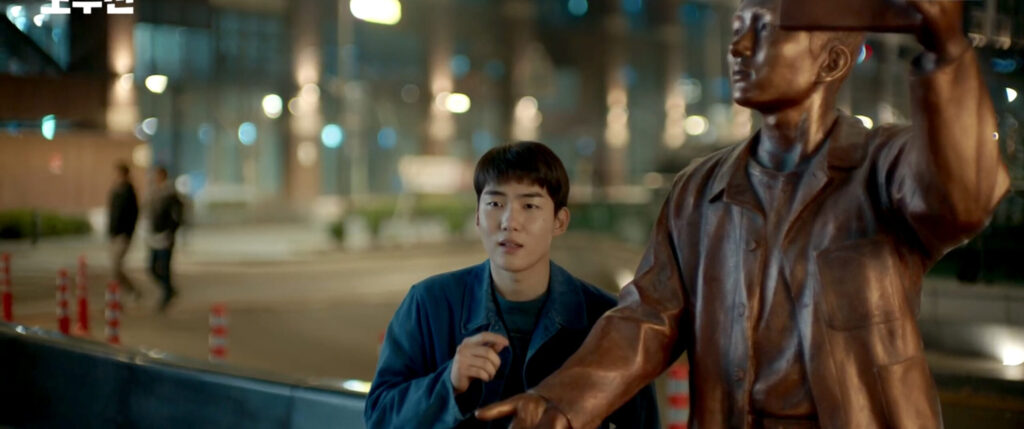
- Labor Rights as Human Rights.
By shining a spotlight on factory workers, the drama elevates the conversation beyond mere courtroom theatrics. It reminds viewers that labor laws aren’t legal loopholes—they safeguard human dignity. - The Power of Unlikely Teams.
Mortals and ghosts teaming up might sound ridiculous. Yet it underscores the notion that progress often requires unexpected alliances. History’s social movements thrived when diverse voices united. - Healing Through Confrontation.
Mu‑jin’s emotional journey from guilt to release dramatizes the importance of facing grief. Suppressing pain only prolongs suffering. Acknowledgment becomes a catalyst for growth. - Karmic Architecture.
There’s an ironic poetry in a building of exploitation collapsing under its own flaws. It reminds us that shortcuts in justice, construction, or relationships almost always backfire. - Regulation as Morality.
Assemblywoman Moon’s flip‑flop wryly suggests that policy isn’t just about votes—it’s a moral compass. Public pressure and media scrutiny can steer lawmakers toward the common good.
My Two Cents (No Ghost Required)
I’ll admit, I’m picky about legal dramas. Court scenes often feel like PowerPoint presentations—dry and overstuffed with exposition. Oh My Ghost Clients broke that mold. It gave us a spectacle: haunted courtroom theatrics, plant‑pot brawls, and a hero who not only bangs gavels but also bangs heads… literally sometimes.
What truly won me over, though, was the emotional honesty. Mu‑jin’s silent suffering and eventual breakdown at Woo‑jin’s memorial hit like a freight train—so relatable that even the ghosts paused their pranks to hand him a tissue. The show dared to blend absurdity with raw humanity, and that’s no small feat.
Plus, the pacing? Chef’s kiss. Each twist felt earned. Foreshadowing hid in casual gags. Payoffs landed with satisfying thwacks. And amid the macabre humor, the series never lost its heart.
Final Verdict
| Aspect | Rating (out of 5) |
|---|---|
| Story & Pacing | ★★★★★ |
| Characters & Chemistry | ★★★★☆ |
| Emotional Depth | ★★★★★ |
| Humor & Sarcasm | ★★★★☆ |
| Social Commentary | ★★★★★ |
Overall Rating: ★★★★½
Oh My Ghost Clients delivers a finale that’s equal parts spine‑tingling, tear‑jerking, and side‑splitting. It honors its characters, champions the underdog, and leaves just enough mystery for a potential sequel. If you haven’t plunged into this supernatural legal world yet, grab the popcorn—and maybe a stress ball—and prepare to be haunted by more than just ghosts.




